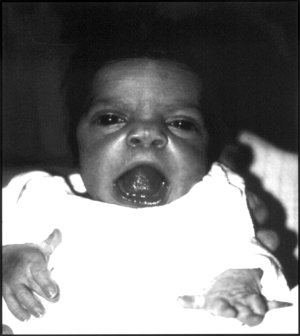Robinow Syndrome

Robinow syndrome is a rare disorder that affects the development of many parts of the body, particularly the skeleton. The types of Robinow syndrome can be distinguished by the severity of their signs and symptoms and by their pattern of inheritance: autosomal recessive or autosomal dominant.
Autosomal recessive Robinow syndrome is characterized by skeletal abnormalities including shortening of the long bones in the arms and legs, particularly the forearms; abnormally short fingers and toes (brachydactyly); wedge-shaped spinal bones (hemivertebrae) leading to an abnormal curvature of the spine (kyphoscoliosis); fused or missing ribs; and short stature. Affected individuals also have distinctive facial features, such as a broad forehead, prominent and widely spaced eyes, a short nose with an upturned tip, a wide nasal bridge, and a broad and triangle-shaped mouth. Together, these facial features are sometimes described as "fetal facies" because they resemble the facial structure of a developing fetus. Other common features of autosomal recessive Robinow syndrome include underdeveloped genitalia in both males and females, and dental problems such as crowded teeth and overgrowth of the gums. Kidney and heart defects are also possible. Development is delayed in 10 to 15 percent of people with this condition, although intelligence is usually normal.
Autosomal dominant Robinow syndrome has signs and symptoms that are similar to, but tend to be milder than, those of the autosomal recessive form. Abnormalities of the spine and ribs are rarely seen in the autosomal dominant form, and short stature is less pronounced. A variant form of autosomal dominant Robinow syndrome includes increased bone mineral density (osteosclerosis) affecting the bones of the skull in addition to the signs and symptoms listed above. This variant is called the osteosclerotic form of Robinow syndrome.
Frequency
Both the autosomal recessive and autosomal dominant forms of Robinow syndrome are rare.
Fewer than 200 people with autosomal recessive Robinow syndrome have been described in the medical literature. This form of the condition has been identified in families from several countries, including Turkey, Oman, Pakistan, and Brazil.
Autosomal dominant Robinow syndrome has been diagnosed in fewer than 50 families; about 10 of these families have had the osteosclerotic form.
Causes
Autosomal recessive Robinow syndrome results from mutations in the ROR2 gene. This gene provides instructions for making a protein whose function is not well understood, although it is involved in chemical signaling pathways that are essential for normal development before birth. In particular, the ROR2 protein appears to play a critical role in the formation of the skeleton, heart, and genitals. Mutations in the ROR2 gene prevent cells from making any functional ROR2 protein, which disrupts development starting before birth and leads to the characteristic features of Robinow syndrome.
Autosomal dominant Robinow syndrome can be caused by mutations in several genes, including FZD2, WNT5A, DVL1, and DVL3. The osteosclerotic form of the condition results from DVL1 gene mutations. The proteins produced from the genes associated with autosomal dominant Robinow syndrome appear to be part of the same chemical signaling pathways as the ROR2 protein. Mutations in any of these genes alter the production or function of their respective proteins, which impairs chemical signaling that is important for early development.
Some people with the characteristic signs and symptoms of Robinow syndrome do not have an identified mutation in any of the known genes. In these cases, the cause of the condition is unknown.
Learn more about the genes associated with Robinow syndrome
Additional Information from NCBI Gene:
Inheritance Pattern
As discussed above, Robinow syndrome can have either an autosomal recessive or an autosomal dominant pattern of inheritance.
Autosomal recessive inheritance means both copies of the gene in each cell have mutations. The parents of an individual with an autosomal recessive condition each carry one copy of the mutated gene, but they typically do not show signs and symptoms of the condition.
Autosomal dominant inheritance means one copy of an altered gene in each cell is sufficient to cause the disorder. In some cases of Robinow syndrome, an affected person inherits the mutation from one affected parent. Other cases result from new mutations in the gene and occur in people with no history of the disorder in their family.